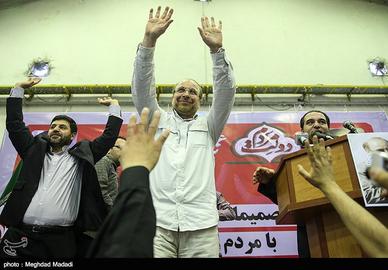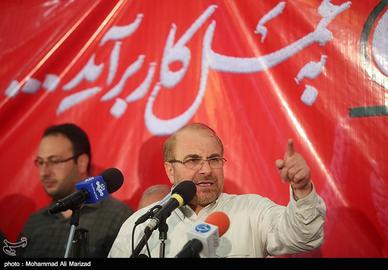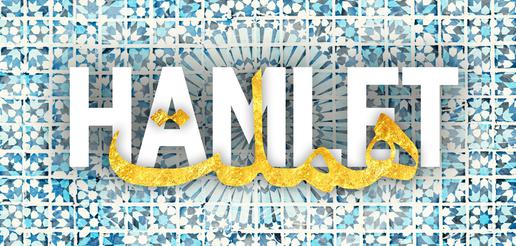Mohammad Bagher Ghalibaf, Tehran’s mayor, has dropped out of the race to become Iran’s next president. In a statement issued on Monday, May 15, he announced his resignation and that he would be throwing his support behind Ebrahim Raeesi. He promised to speak and appear alongside Raeesi in a campaign event scheduled for Tuesday, May 16.
“This was a revolutionary act,” said Raeesi, the favorite candidate of Iran’s ultra-conservatives, in response to Ghalibaf’s decision.
By backing out of the race, Ghalibaf’s hoped to achieve one key outcome: Injecting a boost to the conservative campaign through an element of shock. According to recent polls, Raeesi has been gaining support among voters, so principlist conservatives hope that Ghalibaf’s support will increase voters’ support even further, and fast. Such an increase might not result in Raeesi’s outright victory in the first round of the election on Friday, May 19, but they hope it might force a second round. The election will only go to a second round if there is no majority win on Friday.
In recent weeks, most key principlist figures had argued that a chance of a second round was only possible if both Raeesi and Ghalibaf remained in the race. But, assuming these strategists had been informed about and played a role in Ghalibaf’s decision, it now appears that they are trying a new approach.
But they have a very difficult task ahead. Only days remain before presidential candidates will be required to stop their campaigning, and, in general, Iran’s conservatives do not have a strong record on creating a groundswell. Raeesi’s public personae and support base is not big enough to boost their morale. Ghalibaf’s supporters represent a range of people from across the political spectrum, so it will be difficult to predict how many of them will transfer their votes to Raeesi instead. The conservatives estimate that somewhere between 50 to 80 percent of potential Ghalibaf voters could switch their loyalty to Raeesi. Based on recent surveys, if this estimate is true, then Raeesi will win 30 to 35 percent of the vote — and this is a long way from victory. Nevertheless, they hope that they can compensate for this gap by a better organized and tighter campaign over the next few days and beyond into the second round, and by sending out out a unified message.
Conservatives believe their campaign lacked this unified message in 2013, and that it was a deciding factor in bringing Hassan Rouhani to the presidency. In that election, the principlists put forward four candidates, including Ghalibaf. In total, they received 46 percent of the votes — but this 46 percent was distributed among their candidates, leading them to suffer a rather humiliating defeat. Ghalibaf received more than 6 million votes, the highest among the principlist candidates, but it paled next to the 18 million votes for Rouhani. This big difference made their defeat all the more bitter, so conservative are now, at the very least, determined to escape a repeat of that humiliation.
Building A Political Capital for Raeesi
Even without a victory, this could benefit Raeesi politically. If, hypothetically, 35 million Iranians vote in the coming election and Raeesi succeeds in winning 40 percent of the votes, this would translate to 14 million voters — constituting a considerable social and political capital. This is Raeesi’s first adventure into the political arena, and such a result would help him, up to a point, to safeguard his political prestige even if he loses. This prestige could then be exploited for future political gains.
But whatever this will do for Raeesi, for Ghalibaf, today’s decision was an unmitigated humiliation. After all, throughout the campaign for this election, Ghalibaf was not reserved: By far, he was the most boastful candidate, and bragged about his stature as the conservatives’ most successful executive and adept manager. Ghalibaf has been active in politics for 12 years, but Raeesi has no substantial background in either politics or business.
In fact, Ghalibaf has talked to the public about his superior qualifications and suitability to become president of the Islamic Republic repeatedly over the last year, and he very much hoped to compensate for his loss to Rouhani in 2013. During his campaign, he tried to polarize voters through using populist messages, including portraying Iranian society as divided between the “4 percent” and the “96 percent” — in other words, the privileged versus the underprivileged. In presidential debates, he accused Rouhani’s Vice President Eshagh Jahangiri of dishonesty for running simply to help his boss’ campaign. Jahangiri is expected to bow out of the race, and always has been. But Ghalibaf repeatedly insisted that he had no intention of quitting.
Using the hashtag #Khalibaf — meaning “empty weaver,” and a play on Ghalibaf’s name, which means "carpet weaver" — thousands of Rouhani supporters had gone online to accuse him of being a “khalibaf” and making hollow promises. Now they can rejoice and revel in the belief that their hashtag was right on the nose.
Ghalibaf’s decision to drop out is probably his final act in Iranian national politics. He must be experiencing profound humiliation, a deep sense of failure, and rage. Raeesi might gain something out of his decision, but it’s unlikely that Ghalibaf can recover. He is, hands down, the big loser in this political game.
visit the accountability section
In this section of Iran Wire, you can contact the officials and launch your campaign for various problems


























comments